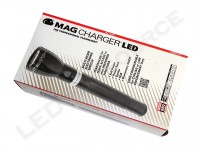 Maglite’s flagship rechargeable MagCharger flashlight has finally been released with a factory LED module, and this latest entry in the Maglite lineup has 680 lumens of output and an intense 43,667 candela spot beam. The MagCharger LED uses a D-sized NiMH battery pack and is a full-size flashlight with 4.5 hours of regulated runtime on high and 16 hours on low. Five modes, including full power, power save, strobe, SOS, and momentary are organized into user-programmable function sets.
Maglite’s flagship rechargeable MagCharger flashlight has finally been released with a factory LED module, and this latest entry in the Maglite lineup has 680 lumens of output and an intense 43,667 candela spot beam. The MagCharger LED uses a D-sized NiMH battery pack and is a full-size flashlight with 4.5 hours of regulated runtime on high and 16 hours on low. Five modes, including full power, power save, strobe, SOS, and momentary are organized into user-programmable function sets.
Key Specifications
- Output: 680 lumens high, 170 lumens low
- Intensity: 43,667 candela
- Runtime: 4h 30min high, 16h low
- Battery: NiMH Rechargeable Battery Pack
- Length: 12.6″
- Diameter: 2.3″ bezel, 1.5″ body
- Weight with Batteries: 28 oz.
- Warranty: Limited Lifetime with $18 Handling Fee
- MSRP: $149.99
- Actual Pricing: ~$125
Pricing & Contents
MSRP for the MagCharger LED is $149.99, and the light is only available in black. Several configurations are available depending on AC plug type, and pricing is around $125 for the most common RL1019 package.
Included in the box are: Maglite MagCharger LED, NiMH rechargeable battery, charging cradle, AC adapter (100-240V), DC car adapter, and user manual.
Batteries
The MagCharger LED uses the same rechargeable battery pack as the updated incandescent MagCharger, which has a 3,500mAh NiMH battery pack and rated for 1,000 cycles. Based on data from the OEM datasheet, this is not low a self-discharge NiMH battery pack and should be charged every couple of months to retain adequate charge.
To charge the light, insert the head of the light into the charging cradle, and push down until the barrel locks in place. Charging is constant current and continuous, which can take up to 20 hours. The light can be left in the cradle indefinitely, but to prolong battery life, this is not recommended for long periods of inactivity.
The Light
On the exterior, the MagCharger LED is approximately the size of a Maglite 3-cell D and nearly indistinguishable from the incandescent version. This full-sized light has a type-III anodized finish to protect against scratches and corrosion.
Head
The head features a polycarbonate window and a smooth reflector. Focusing takes less than a quarter turn from end to end, going from flood to spot to flood.
The head mounted switch is an electronic switch similar to that of the XL- and ML-series lights.
Body
The MagCharger’s distinctive charging bands are O-ring sealed and diode-protected to prevent accidental short circuiting, and smooth diamond knurling covers most of the body.
Tail Cap
A band of knurling is found on the tail cap, and the threads are anodized so the light can be locked out with a quarter turn of the tailcap.
Modes
Five modes, which are arranged into four function sets, are available for the user to choose from.
Full Power
Maximum output (100%).
Power Save
Reduced output (25%).
Strobe
The 12Hz strobe feature is designed for disorienting or getting somebody’s attention.
SOS
SOS is the International Morse Code Distress Signal: three short flashes, three long flashes, and three short flashes.
Momentary
If momentary is enabled, the light turns off when the switch is released, and it must be pressed twice in quick succession to activate constant-on.
For all modes except for momentary, a single click will turn the light off.
Function Sets
To change the function set, start with the tailcap slightly unscrewed so that the light does not turn on when the switch is pressed. Press and hold the switch while screwing on the tailcap, and once the tailcap is screwed on all the way, the light will start flashing. The number of flashes corresponds to a function set’s number, which are cycled. Releasing the switch selects the function set.
Function Set 1 (Default)
Full Power, Power Save, Strobe.
Function Set 2
Full Power, Power Save, SOS.
Function Set 3
Momentary, Full Power, Power Save.
Function Set 4
Momentary, Full Power, Strobe.
Performance
Using the latest Cree XM-L2 LED, the MagCharger LED is rated for 680 lumens. The redesigned focusing assembly eliminates “donut holes” in the beam pattern and makes focusing quicker.
On the two ends of the focusing cam are two distinct flood beams – a slightly larger hotspot with a defined cutoff (left) and a smoother flood pattern (right).
There is a standby current drain of 673 µA (0.673 mA), which combined with NiMH self-discharge, will require the light to be charged every 3-4 months if unused.
Runtime
If you haven’t read our article about runtime graphs and the ANSI FL1 Standard, please click here.
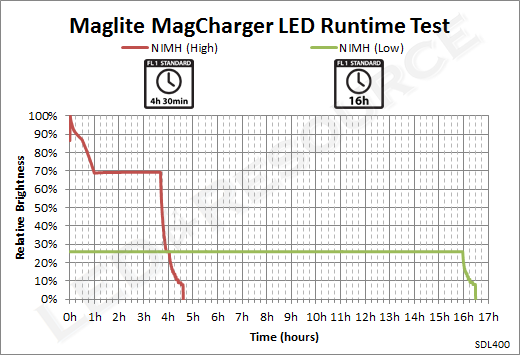
The MagCharger LED steps down to 70% after the first hour and maintains a steady output for almost three more hours. ANSI runtime of the MagCharger LED is 4h 30mins, which is longer than most ultra-high output lights that typically have around two hours of runtime.
Conclusion
Full-sized lights are less of a common sight nowadays, but with its large NiMH rechargeable battery, the MagCharger LED has roughly twice the runtime of a similar mid-sized light. Increased runtime is beneficial for many professional usage scenarios where it may not be possible or desirable to charge batteries, and 4h 30min on maximum output is plenty for most flashlight users. This is also a light that is easily customizable with an option for momentary operation, as well as flashing strobe or SOS modes. For users coming from alkaline D-cell lights or the incandescent MagCharger, the new Maglite MagCharger LED will easily outperform many lights both small and large.
| Pros | Cons |
|
|
Related Links

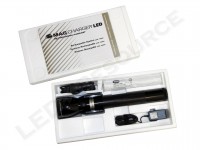
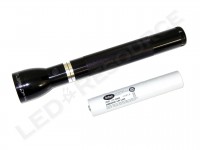
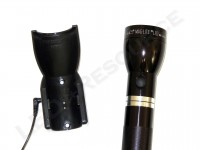
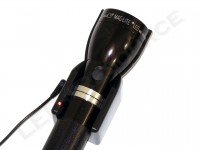
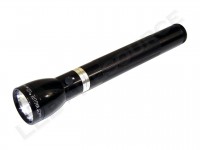
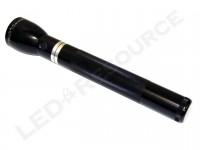
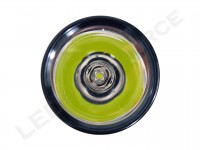
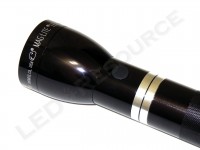
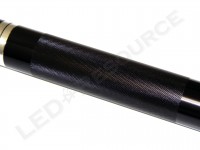
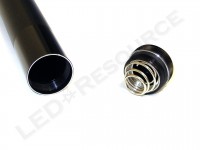
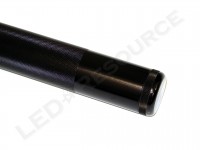
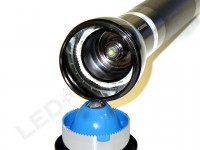
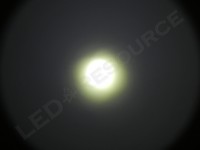
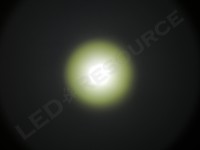
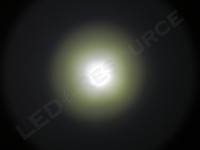


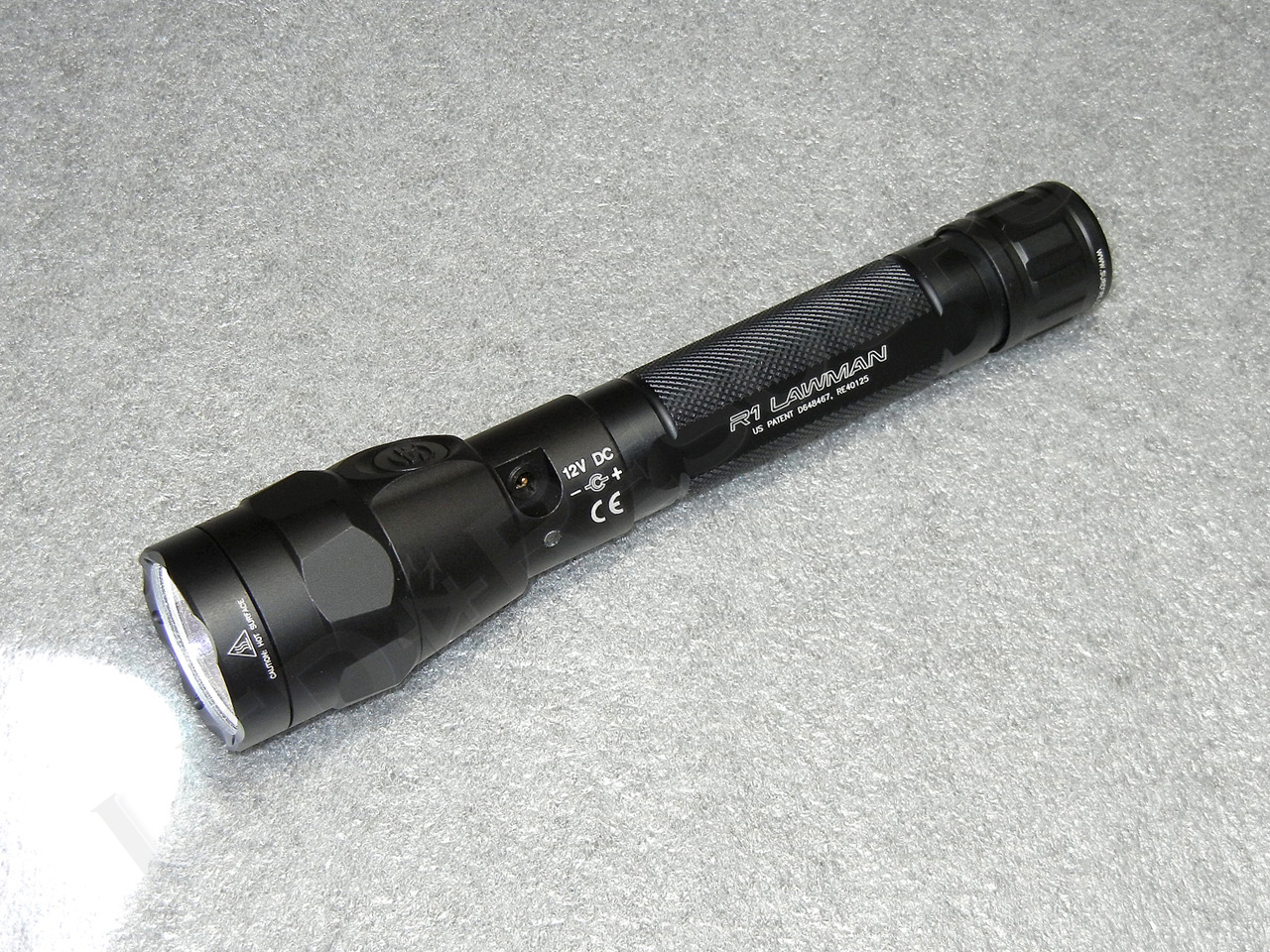
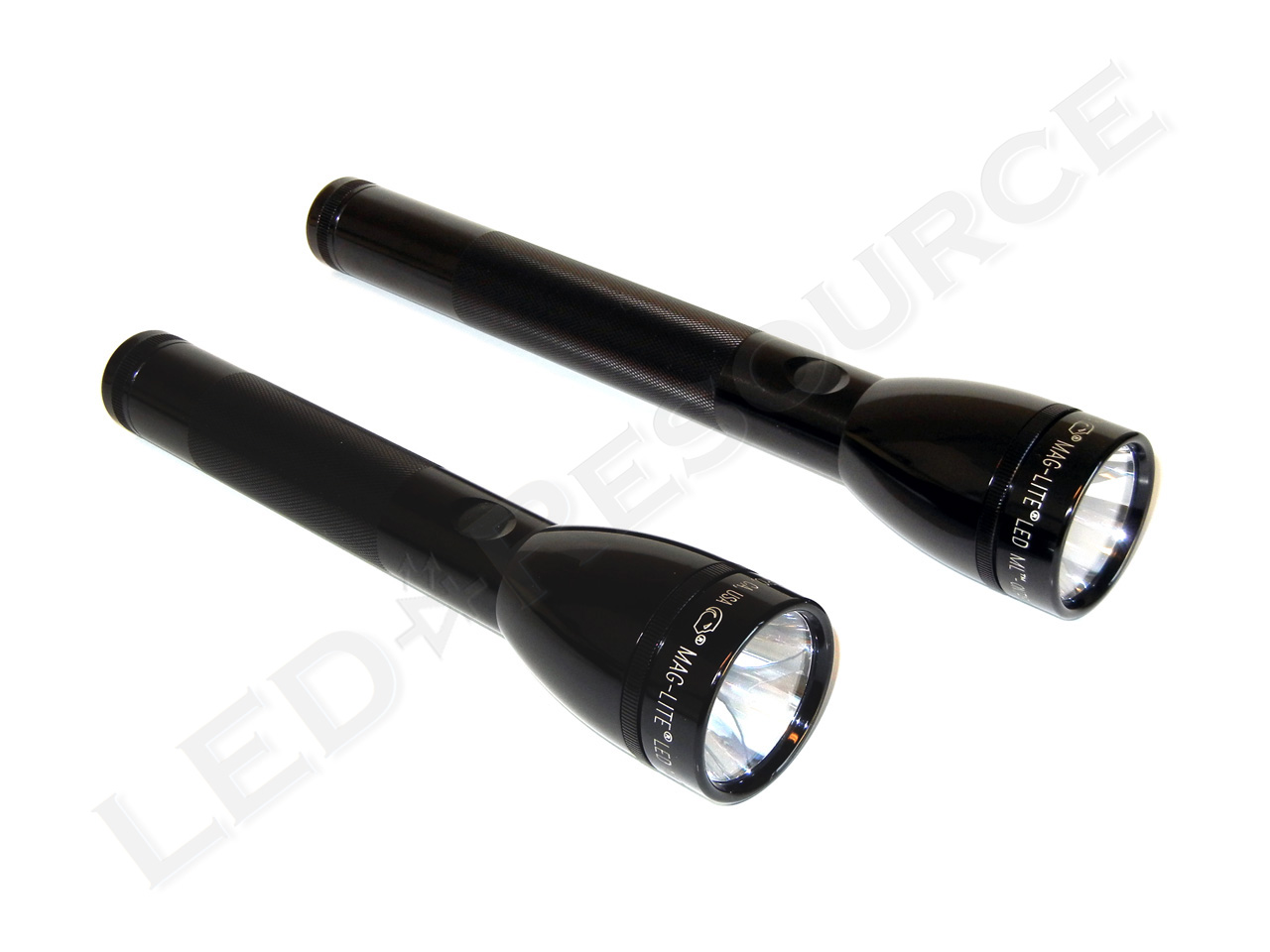

Thanks much or this and all of your excellent reviews!
I think I would really like one of these but it does seem expensive for what it is. The plastic lens and reflector are disappointing at this price point, but what really bothers me is the battery and charging system – a non LSD battery and a dumb charger just doesn’t cut it. It should have a LSD NiMH or Li-ion battery and a smart charger.
I could see it being a problem if you forget about the self discharge and end up needing up to 20 hrs. to charge. I like slow chargers when I have the time but there may well be times when a 20 hr. charge is too long, especially when you are stuck charging with the light tied up in the charger. I think a charger with the option of charging the battery packs outside of the light would be better if you had 2 or more battery packs, allowing the light to be used with one pack while the other is charging. It would also be real nice if the Mag Charger could run off of alkaline primaries in a pinch, even at greatly reduced out put.
My question is: Are there any other LSD or Li-Ion batteries that would work in the Mag Charger available?
Aside from the battery/charger, I really like the Mag Charger’s run time, output, throw and programmable function sets. Which reminds me…..I wish they would get rid of the SOS and maybe offer a momentary strobe, full power, power saver set and/or a momentary strobe, constant strobe and full power set.
Thanks again for the reviews and sorry for rambling so much.
No worries, those are all good points!
There aren’t many LSD NiMH D-cells to begin with, and the MagCharger uses five 3/5 D-cells, so it’s unlikely. As for lithium-ion, it will require a different charger, which means that it’s going to be almost impossible.
However, the MAG-TAC Rechargeable will use lithium-phosphate…
Robin
I was thinking that there might be some Li-Ion batt(s) that could power the magcharger using a different charger?
You might be able to get 2 x 18650 working, but you’ll need to make an adapter so the cells don’t wobble.
I don’t think it’s worth the effort though, not to mention questionable safety, so it might be better just to get a different light…
Robin
Excellent review and a product I’ve been waiting for now for about 3 years. I have two beefs about the product:
1) The NiMH battery is not LSD. Ridiculous! Granted there aren’t many about but I’m sure Mag Instuments could source them, especially in the quantities they’e likely to sell!
2) Plastic lens-Less of an issue are there is a chap in the UK who sells glass lenses to suit a MagCharger so that’ll do fine.
Everything else is great. Going to the top of my shopping list as soon as its available in the UK.
hey how are, i gusted bought a magcharger, i don’t realizes when the battery is full charged. do anyone knows how i realized that? thank you diego
Diego,
The MagCharger uses a steady charger, which means that it is continuously charging. Typically, it takes 10-12 hours to charge. If the battery is fully discharged, it can take up to 20 hours.
As long as you don’t leave the MagCharger charging for an extended period of time (weeks or months), the excess charge won’t be an issue.
Robin
I have a older maglight rechargeable. I will not light up. Both bulbs have been tried,battery checked fully charged with a volt meter. Any ideas for me to try ?
Steve,
I would check the positive battery contact (all the way inside the barrel, you can clean it with the eraser of a pencil), as well as the tailcap. Use a paper clip to short the negative end of the battery to the exposed part of the barrel and see if that works.
Robin
Hey robin,
When will you be reviewing the 3rd generation D cell lights? Great site by the way.
Is this light coming with a replacement bulb? Or are you depending on Maglites service when the led is defect? How does this light compare to the 1300 lumen led upgrades from http://www.ledmag.nl?
Hi Tim,
LED flashlights do not include replacement bulbs because the LED module is designed to last for the lifetime of the flashlight. While rare, failures do sometimes happen due to the nature of electronic components.
Robin
Are you going to do a review on the new V2 of the RL1019
Hi Kevin,
We generally don’t re-review lights unless there are significant changes, so we will not be posting a full review for V2. The differences are limited to function sets (lower output mode replaces SOS) and the charging cradle.
Robin
Hi Robin!
Are you going to do a review on the new 3rd Gen Maglite D-cell lights?
When you do a review of Maglites 3rd Gen D Cells I belive you will find that they are closely related to the new MAG Charger LED in construction and operation.
Just purchased the LED rechargeable flash light from galls and installed it in our patrol car. The light will not charge. On the charger we have a constant green light wither the light is in the cradle or not. Owners guide states that the light on the cradle should change to orange to indicate charging.
Eugene,
Does it have the same behavior when you use the AC adapter? It sounds like there is either wiring issue or the charger is defective. The status LED should not be illuminated when the light is not in the charger.
Robin
I’ve read on CPF that the LED MagCharger is not compatible with old charge cradles. Can you shed some light on this, Robin?
Andrew,
That is correct. The dimensions are slightly different, so the charging bands won’t line up with the contacts on the old charge cradles.
Robin